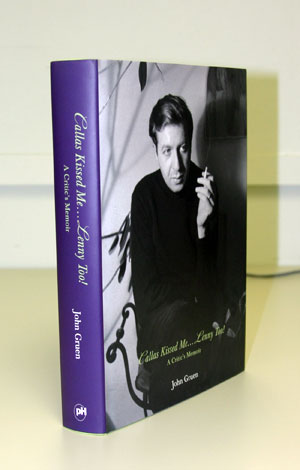
A kiss and tell book … as promised by the title!
John Gruen’s life story—in addition to the main character’s dramatic adventures—offers delectable peeks into the lives of the artists, writers and musicians who have been companions, friends, and lovers during the journey.
It could be a movie made by the ghost of Fellini—celebrities come and go, drink and sing together, fall in love and out again, cringe or gloat; create art. The setting: pre-World War II Europe, New York City, the Hamptons. Photography: numerous elegant, black and white and color pictures, most taken by the author.
It’s a daunting assignment, to review the work of this meister reviewer—the man who was the chief art critic for New York Magazine, who has written for the New York Herald Tribune and The New York Times, among many other prestigious publications; the man who has authored 15 previous books; who is a composer and a photographer as well.
Since his birth—as Jonas Gruen—in 1926, in France, the author’s life has encompassed frightening as well as triumphant experiences, intense love and sadness, artistic success as well as disappointment. If there was a dull moment, it is not recorded in this memoir.
It is a story of survival. Like many German Jews at the time, most of the Gruen family could not believe that Adolf Hitler was in deadly earnest when he set out to eradicate an entire population. “They felt German through and through,” Mr. Gruen writes. ‘It will all blow over,’ they said.”
John’s father, Abraham Gruen, saw more clearly. On a trip to Italy in 1933 he learned “things that were neither aired nor published in Berlin,” where the family lived at the time. Thanks to his prescience, his wife and four sons escaped overnight to Milan, and later made their way to the United States.
Mr. Gruen’s three brothers were teenagers when he was born. He was the “unexpected,” and, he felt, unwelcome baby whose care was left mostly to servants. Although the senior Gruen was heroically protective of his family, he had a brutal temper which made their domestic life a misery. The boys were not defended by their mother, who “mostly stood by and said nothing. She had become the good German hausfrau obeying her husband.” Not surprisingly, none of the adult children would have anything to do with their father’s jewelry business later.
John Gruen and his parents arrived in New York in 1939, separated by immigration quotas from his brothers, who were German-born and therefore citizens of a “hostile power.” The story of their travels and reunion would make a book in itself.
Meanwhile, Mr. Gruen recounts with bittersweet humor his struggles to lose his thick “refugee” accent by attending as many movies as possible, and his efforts to date American girls. He experienced “the real America” while attending the University of Iowa, where he studied drama, literature, music, and art history. And where he met the love of his life, the all-American beauty and talented painter Jane Wilson.
The beginning of their 60-year marriage, and their move to New York, was also the start of their nonstop involvement with the avant-garde. Countless dinner parties and nights at the Cedar bar were supported by work in photography and journalism. Jane Wilson contributed to the family budget with work as a fashion model. When they could afford it, they purchased a barn in Water Mill.
They knew not only “the crowd,” but many such groups: the Partisan Review crowd, the Poetry Magazine crowd, the Hudson Review crowd, the poets E.E. Cummings and Dylan Thomas. The “art crowd” included Larry Rivers, Willem de Kooning, Andy Warhol—to mention just three. In music and dance there were Maria Callas, Gian Carlo Menotti, Rudolf Nureyev, and the Leonard Bernsteins. Again, these are only a few out of dozens of names that could legitimately be dropped here.
While Jane Wilson devoted herself singlemindedly to painting, Mr. Gruen composed art songs that gained praise from fellow artists and critics, but produced no financial gain. When he finally found a dream job as a music critic for the Herald Tribune, he was “overcome with pride”—even though his first reviews were signed only with his initials.
A memoir is expected to be candid, and intimate confessions can become news. Mr. Gruen’s personal life has not produced any front-page scandals, but his book frankly describes various close encounters with men and women. An Italian housemaid and a young male piano teacher vied for his sexual attention when he was 11—he liked them both. Later, while writing a biography of Leonard Bernstein in the 1960s, the intense relationship referred to in the book’s title caused considerable emotional upheaval.
Mr. Gruen, an honest writer, acknowledges both the heartache and joy that have been part of his life. In his buoyant prose, joy predominates.
This is not a coffee-table book, in the sense that it will not rest on the table for long. Guests will want to peruse it, to admire the photographs of people they know or wish they had known. Less scrupulous visitors may be tempted to make off with it altogether. Perhaps, to be on the safe side, thoughtful hosts of the Hamptons should provide themselves with two copies.